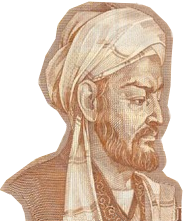
Back Avicenna Afrikaans Avicenna ALS ኢብን ሲና Amharic Avicena AN ابن سينا Arabic ابن سينا ARZ Avicena AST İbn Sina Azerbaijani ابن سینا AZB Әбүғәлисина Bashkir
| Avicena | |
|---|---|

| |
| Avicena | |
| Gimė | 980 m. netoli Bucharos |
| Mirė | 1037 m. (~57 metai) Persijos Hamadane |
| Veikla | gydytojas ir filosofas |
| Avicena | |
Avicena (Abu ali al Husain ibn Abdalllah ibn Sina, sutrumpintai Ibn Sina[1]; 980 m. netoli Bucharos – m. 1037 m. Persijos Hamadane) – persų kilmės,[2] tačiau daugiausia arabiškai rašęs gydytojas ir filosofas. Taip pat rašė teisės, matematikos, astronomijos, muzikos klausimais. Persiškai kūrė poemas ir lyrinius eilėraščius, arabiškai – apysakas. Avicena laikomas Islamo aukso amžiaus vienu svarbiausiu gydytoju, astronomu, mąstytoju,[3] ankstyvosios modernios medicinos tėvu.[4][5][6]
- ↑ Byrne, Joseph Patrick (2012), "Avicenna", Encyclopedia of the Black Death, Vol. I, Santa Barbara, CA: ABC-CLIO, ISBN 978-1-59884-253-1.
- ↑ Avicenna and the Visionary Recital (anglų). Princeton University Press. 2016-04-19. ISBN 9780691630540. Nuoroda tikrinta 2018-08-12. „In this work a distinguished scholar of Islamic religion examines the mysticism and psychological thought of the great eleventh-century Persian philosopher and physician Avicenna (Ibn Sina), author of over a hundred works on theology, logic, medicine, and mathematics.“
- ↑ * Bennison, Amira K. (2009). The great caliphs: the golden age of the 'Abbasid Empire. New Haven: Yale University Press. p. 195. ISBN 978-0-300-15227-2. „Avicenna was a Persian whose father served the Samanids of Khurasan and Transoxania as the administrator of a rural district outside Bukhara.“
- Paul Strathern (2005). A brief history of medicine: from Hippocrates to gene therapy. Running Press. p. 58. ISBN 978-0-7867-1525-1.[neveikianti nuoroda].
- Brian Duignan (2010). Medieval Philosophy. The Rosen Publishing Group. p. 89. ISBN 978-1-61530-244-4..
- Michael Kort (2004). Central Asian republics. Infobase Publishing. p. 24. ISBN 978-0-8160-5074-1.
- "He was born in 370/980 in Afshana, his mother's home, near Bukhara. His native language was Persian" (from "Ibn Sina ("Avicenna")", Encyclopedia of Islam, Brill, second edition (2009). Accessed via Brill Online at www.encislam.brill.nl).
- "Avicenna was the greatest of all Persian thinkers; as physician and metaphysician ..." (excerpt from A.J. Arberry, Avicenna on Theology, KAZI PUBN INC, 1995).
- "Whereas the name of Avicenna (Ibn Sina, died 1037) is generally listed as chronologically first among noteworthy Iranian philosophers, recent evidence has revealed previous existence of Ismaili philosophical systems with a structure no less complete than of Avicenna" (from p. 74 of Henry Corbin, The Voyage and the messenger: Iran and philosophy, North Atlantic Books, 1998.
- ↑ Saffari, Mohsen; Pakpour, Amir (2012-12-01). „Avicenna's Canon of Medicine: A Look at Health, Public Health, and Environmental Sanitation“. Archives of Iranian Medicine. 15 (12): 785–9. PMID 23199255. „Avicenna was a well-known Persian and a Muslim scientist who was considered to be the father of early modern medicine.“
- ↑ Colgan, Richard (2009-09-19). Advice to the Young Physician: On the Art of Medicine (anglų). Springer Science & Business Media. p. 33. ISBN 978-1-4419-1034-9. „Avicenna is known as the father of early modern medicine.“
- ↑ Roudgari, Hassan (2018-12-28). „Ibn Sina or Abu Ali Sina (ابن سینا c. 980 –1037) is often known by his Latin name of Avicenna (ævɪˈsɛnə/)“. Journal of Iranian Medical Council. 1 (2): 0. ISSN 2645-338X. „Avicenna was a Persian polymath and one of the most famous physicians from the Islamic Golden Age. He is known as the father of early modern medicine and his most famous work in Medicine called "The Book of Healing", which became a standard medical textbook at many European universities and remained in use up to the recent centuries.“
© MMXXIII Rich X Search. We shall prevail. All rights reserved. Rich X Search